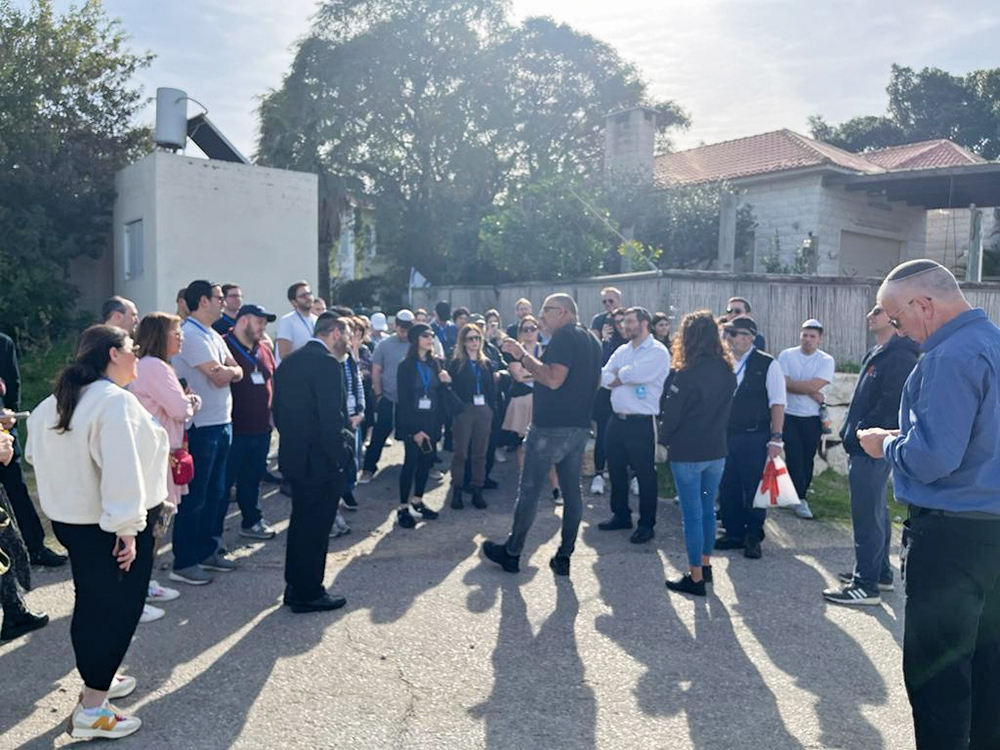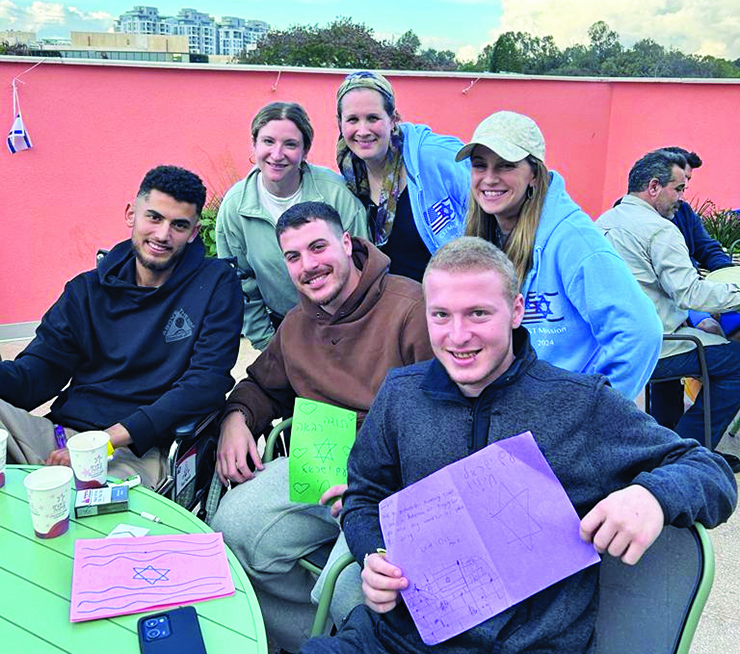
Tel HaShomer.
Last week, the Young Israel of New Rochelle sent a delegation of 40 congregants to Israel on a three-day solidarity mission. The mission included Rabbi Reuven Fink and Rebbetzin Abby Fink, the shul’s rabbi and rebbetzin, and Rabbi Chaim Axelrod, the shul’s assistant rabbi. It was planned and organized by Adina Garbuz, Michal Abehsera, and Ellie and Elly Goldberg.
On their first day, the mission participants visited Netiv Ha’Asara, a small, beautiful moshav (settlement) just north of Gaza. The moshav had been invaded by terrorists on October 7, and the devastation was evident. Etai, the chairman of the moshav, took the YINR members to many of the homes, since he knew everyone personally. He stressed that the community, which is small and family-like, is aching to move back home as soon as they can.
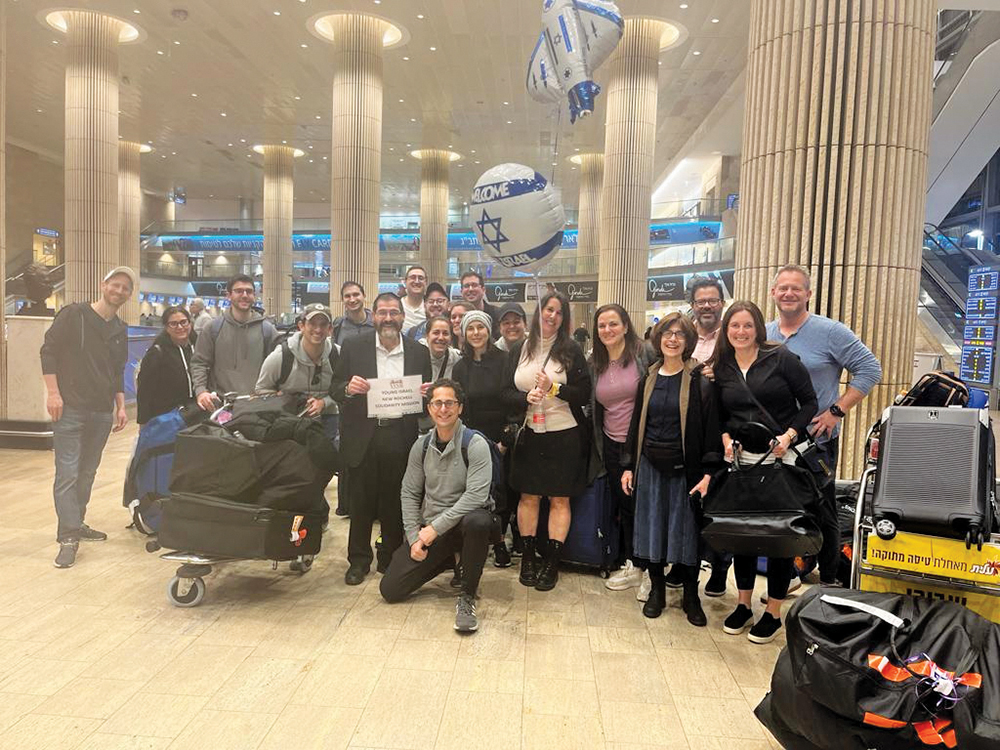
The mission then drove further down south, and visited Kibbutz Be’eri, which was destroyed by hordes of terrorists on October 7. Like Etai, their Be’eri guide emphasized continually that the kibbutz residents will return and rebuild their home. One mission member described the situation: “Be’eri is probably, sadly, one of the perfect examples of the atrocities of October 7th. There were 1,200 people living there, 384 families. It’s a kibbutz that’s been around since 1946—before Israel even existed as a state. Three hundred Nakba terrorists invaded the kibbutz that day, plus 100 Gazans who were not Nakba terrorists. They murdered 100 inhabitants of Be’eri, kidnapped another 50, and raped countless women. Two-thirds of the kibbutz has been burnt to the ground, and it’s a horror scene. It will need to be rebuilt.”
The group then visited Tzomet Gilat, a pop-up rest stop for soldiers coming out of Gaza. The rest stop includes plenty of food, a barber, and even massage therapists. The mission members spoke with the soldiers and gave them letters that they had collected from both children and adults in New Rochelle. Adina Garbuz reported that one soldier hugged her letter, and said, “I’m never putting this down. I will hold this my whole life!”
Mission member Lauren Bochner said: “At Tzomet Gilat it was incredible: People are coming from all over the world to volunteer their time and give their money and show that they are here to do what they can.” Another member added, “We kept saying, ‘Thank you for what you are doing,’ and they would thank us.”
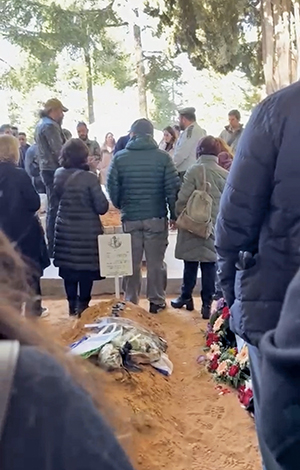
In a similar vein, member Cory Baker relayed that he noticed an American family eating with their son, a lone soldier. He went over to speak to them. The soldier asked Baker who he was and Baker explained that he was with his shul coming to bear witness and give chizuk (support, giving strength). The soldier got up, hugged him and thanked him profusely. Baker laughed and said, “You are thanking me? Do you realize how funny that is? You’re risking your life every day.” The soldier said, “Am Yisrael is about everybody doing their part. Don’t forget for a minute how important it is for people like you to come and do yours.”
On the second day, Garbuz reported that the mission met with a mother of three young children. Her husband had left on October 7 as a reservist (in miluim) to fight in the war. Her children were asking many questions about the war and her husband’s duties. It was difficult for her to find the right language to discuss it with them, and she realized that many other families were in the same situation. In just two weeks, she wrote a book, hired an illustrator, and published it with money out of her own pocket. She gives it out for free to mothers whose husbands are fighting to help provide the language for children to understand what’s happening. The book is called “Mishpacha Bamiluim” (“A Family in Reserves”) and is currently being translated into English.
A difficult moment was visiting wounded soldiers in Ichilov Hospital in Tel Aviv. The mission members broke up into small groups and went into different rooms to listen to the soldiers’ stories. The delegates gave the soldiers letters from the New Rochelle community, and gave candy platters to the nurses. The appreciative nurses said, “Nobody ever gives the candy to us; they always give everything to the soldiers!” They opened the candy baskets immediately and shared them with the patients and their families.
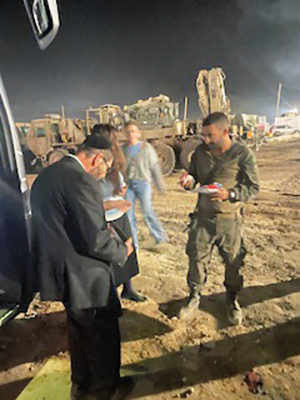
Garbuz described visiting one young man who had lost both legs and whose face was covered with shrapnel. “We looked in his eyes. We hope that we gave him chizuk, and we certainly got chizuk from him.”
At Kikar HaChatufim (Hostage Square), the mission met with Or Selah, who shared his story. Or had lost 12 family members on October 7: Three were murdered and nine taken hostage. He told the mission that he, along with the relatives of other hostages, had spoken with President Joe Biden for an hour-and-a-half on Zoom. He said that Biden sat there and listened carefully and sympathetically. Or expressed that he was extremely impressed with Biden and with American Jewry for fighting for the cause alongside Israelis.
Selah also mentioned that two of his relatives had been released from captivity. “But something that is really important to understand,” he said, “is that when the hostages are released physically, it doesn’t mean that they are not hostages anymore. So, when the hostages are released, we should understand that this is only the first stage for them.”
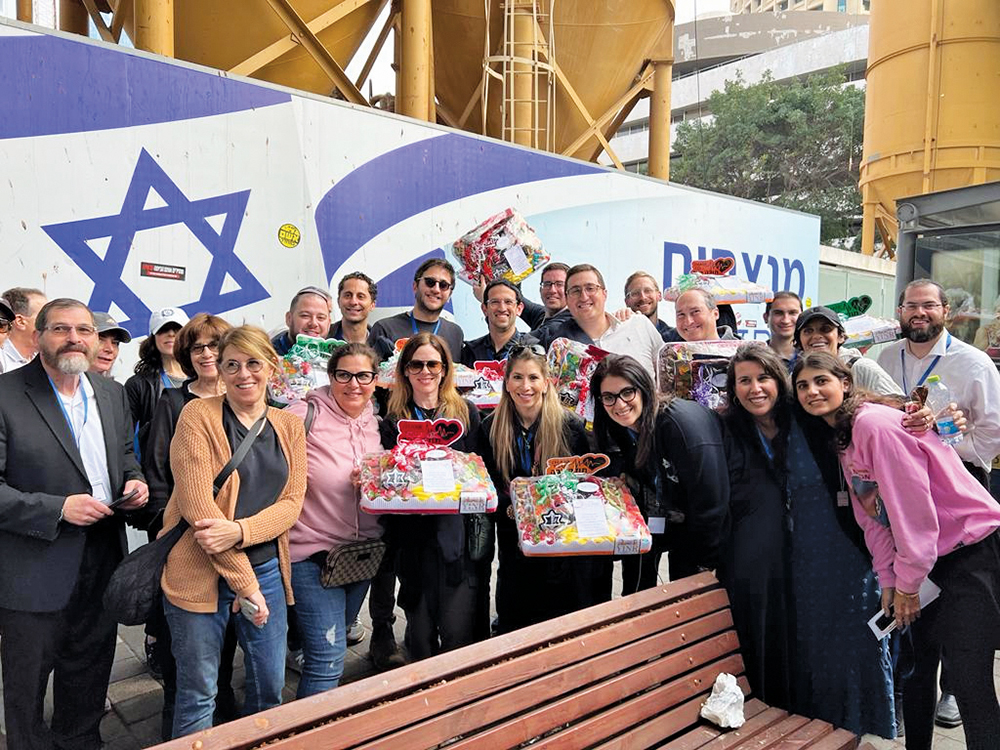
Rabbi Axelrod found that the most meaningful moment of the entire mission was not one they planned. When the group went to Har Herzl, the Israeli military cemetery, they went to the newest section, containing the graves from soldiers who fell in the past month. They happened to come upon people attending a shloshim (ceremony marking 30 days from the death) for soldier Eliya Yanovsky, so they joined. “The experience of seeing his family and his friends, and three of his fellow soldiers who were wheeled to his grave in wheelchairs, was very powerful. To see and experience the raw emotion made everything feel more real. I realized how each sacrifice of these soldiers is this scene: family, friends, a father saying Kaddish for his son.”
On the final day, as their last activity, the group went to visit a hotel in Tel Aviv where the displaced community from the settlement Netiv Ha’Asara is currently living. “We got to see a little bit of what life is like for them now,” Garbuz said. She explained that the group went in tentatively, because they didn’t want to seem invasive, and “we didn’t know how they would feel about us being there.”
The Netiv Ha’Asara community members were welcoming from the beginning, but once the group explained that they had just been to Netiv Ha’Asara and seen the homes and world of the refugees, the moshav members were surprised and very touched. Garbuz concluded that it was clear how their lives have been completely disrupted, and how much they want to go home. The New Rochelle community has “adopted” the Netiv Ha’Asara community, as a town that New Rochelle will focus on helping to rebuild, as part of the “Atufim” project of Rav Rimon’s organization, Sulamot.
On the last night of the mission, Rabbi Fink addressed the group at dinner. “Horror was brought to the world,” he said. “Evil incarnate was brought to the world. Unimaginable savagery. What do good people do when faced with horror? What’s the reaction of good people when evil is spread across the world? Good people say: ‘We are going to counter evil with goodness. We will counteract the savagery by caring for other people.’ And that’s what we have been doing here.
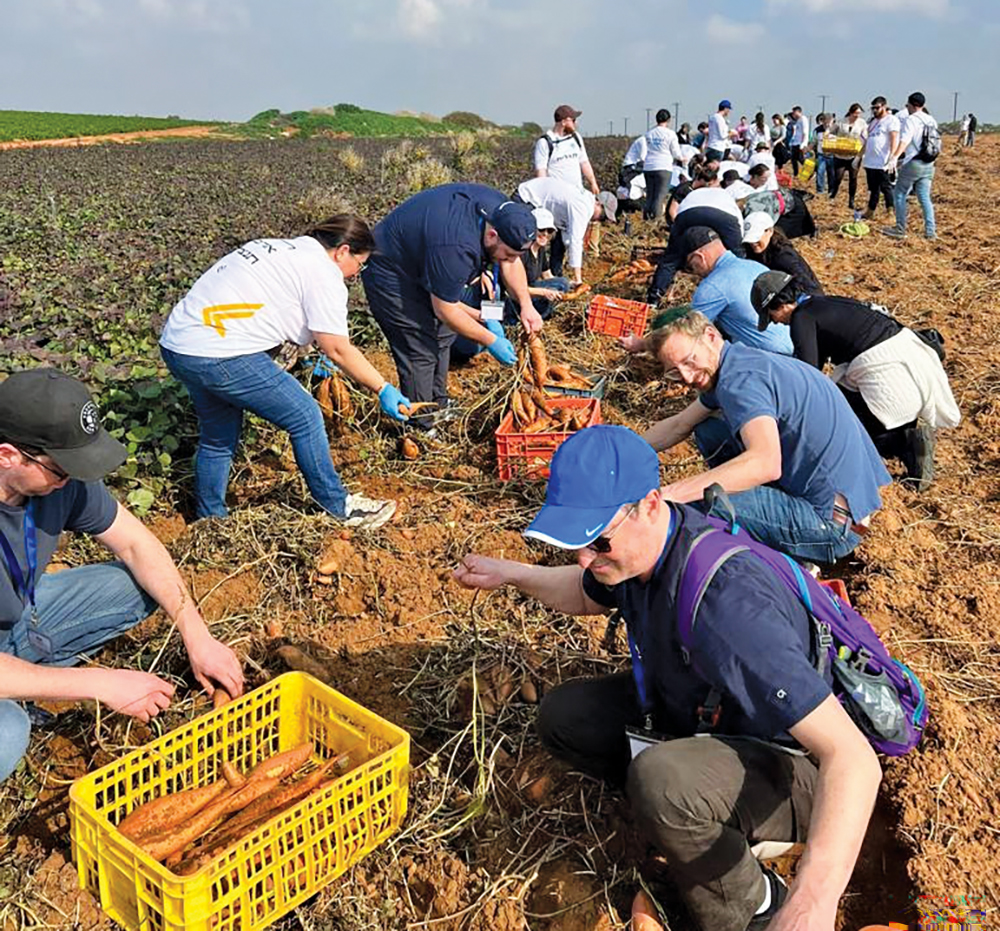
“We went to hear the stories of the people who were there, and that way we were able to participate and share in their pain. To share in the burden. We did it by giving chizuk and by sharing ourselves with them. That’s the way that good people combat evil. When we went to Ichilov hospital, it was not easy to speak to patients—to people who were wounded emotionally and physically. We shared the burden with them—that’s bikur cholim. That’s what good people do.
We look that evil spirit in the face and we say: ‘No! You are not going to win. You are not going to be victorious, because there are good people in the world and good vanquishes evil. Light extinguishes darkness.’”
Upon returning from the mission, Rabbi Fink reflected: “What made this mission so meaningful was the fact that every strata of our community participated in this effort. Young and more senior people added different insights and reactions that created a deep and comprehensive experience. The 40 members of the group came together and forged lasting friendships.” Rabbi Axelrod added: “I enjoyed watching different age groups meld together. I take it for granted that everyone knows each other, but Baruch Hashem the community has grown so much that not everybody does. We were all on one bus, spending a lot of time together, and this enabled the community members there to get to know one another.”
Delegate Gerald Cohen said: “While we sit in America following all of the terrible news, we feel a sense of helplessness, which leads to anxiety and hopelessness. When you go to Israel, there’s quite a bit of suffering and sadness, but you don’t see the same type of anxiety. I saw a country with resolve, all coming together, to get the job done in Gaza and to return the hostages. I was overwhelmed by how resilient the Israelis were.”
Michal Abehsera, one of the organizers, said: “Every story, every face, every memory is a part of our story. We are a nation that needs to tell the story, to hold a hand, to embrace in a hug, and to be united as one. The shock of October 7th has evolved into a deep sadness, leaving a permanent scar on all of our hearts. We must take this pain and use it to create more love. To help, to heal, to rebuild, and to grow.”
